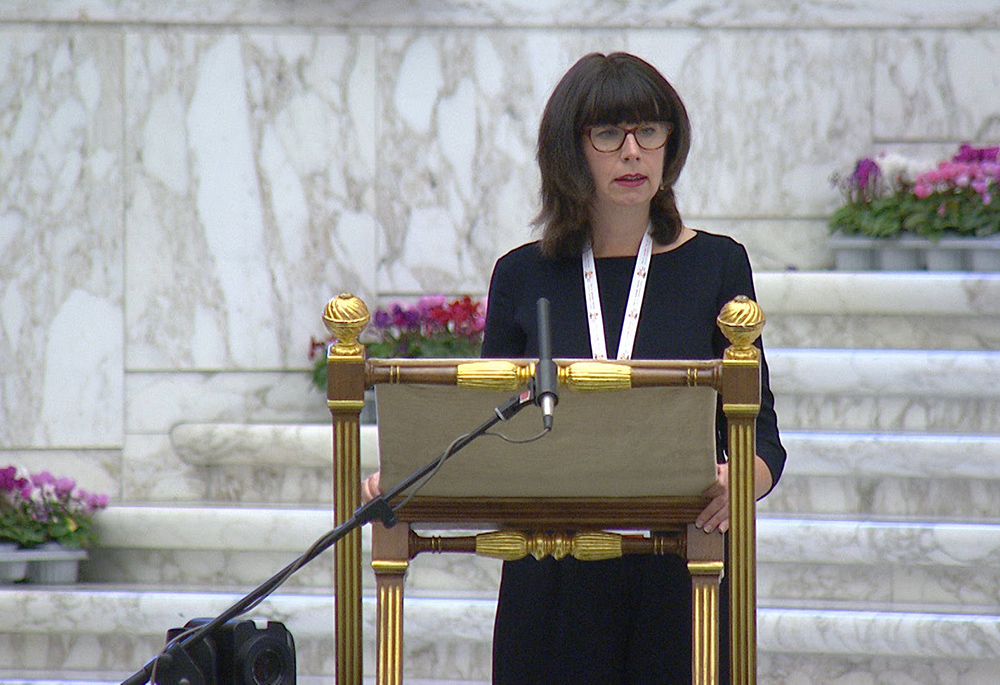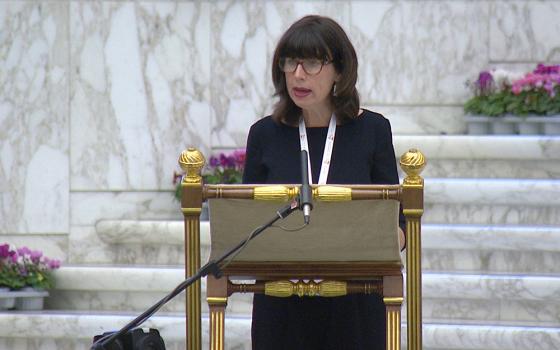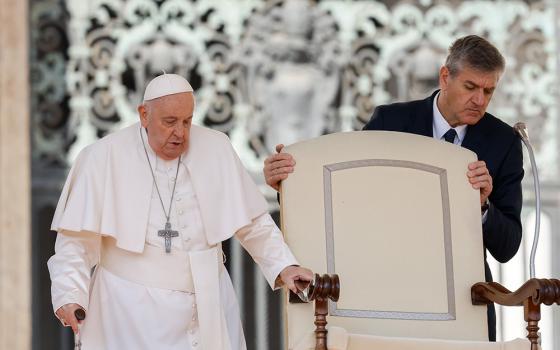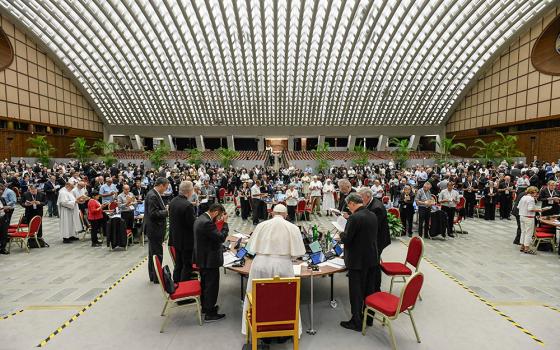Members of the assembly of the 2023 Synod of Bishops meeting in the Vatican's Paul VI Audience Hall on Oct. 9 (CNS/Lola Gomez)
As Pope Francis' high-stakes summit on the future of the Catholic Church entered its second week on Oct. 9, the some 460 participating bishops and lay members focused on the theme of "communion" and considered how the church might provide greater welcome to all of its members.
The delegates of the Oct. 4-29 Synod of Bishops are expected to continue discussions on that theme throughout the week, and also to discuss how Catholics can improve relations with other Christian denominations.
"If we act like Jesus, we will testify to God's love for the world," said Luxembourg Cardinal Jean-Claude Hollerich, one of the principal coordinators of the 2023 synod. "Failing to do so will make us look like an identitarian club."
Laying out the themes for the week ahead, the cardinal recalled the pope's recent and now-often cited mantra that the Catholic Church should be open to "todos, todos, todos" ("everyone, everyone, everyone.")
"Jesus extended this communion to all the sinners. Are we ready to do the same?" he asked at the beginning of the second week of synod meetings. "Are we ready to do this with groups which might irritate us because their way of being might seem to threaten our identity?"
Hollerich's remarks marked the start of the second phase of the synod's discussions. The assembly's small group discussions this week, he said, will consider questions regarding ecumenism, interreligious dialogue and ecology, among other topics.
While the synod sessions are generally being held in private, the Vatican is offering a livestream at the beginning of each phase of discussions, which are being termed as "modules."
Hollerich, a Jesuit, told the delegates he had been warned that tensions inside the synod hall will begin to rise this week as the body considers more contentious topics. Toward the end of the week, the assembly is expected to begin discussions on themes including the possible ordination of women as Catholic deacons.
"We are not afraid of tensions," he said. "Tensions are a part of the process, as long as we consider ourselves to be sisters and brothers, walking together."
At the start of the synod's session on Oct. 9, Cardinal Mario Grech, the leader of the Vatican's synod office, told the synod participants that some of their fellow members had come down with COVID-19 infections and would not be attending the sessions. Grech, who suggested participants should wash their hands frequently and said they could also wear masks if desired, later specified that the synod was aware of four such infections.
Francis did not take part in the Oct. 9 morning session. Vatican spokesman Matteo Bruni told NCR the pontiff had other engagements that morning.
Prior to the start of table discussions, British theologian and former leader of the global Dominican Order, Fr. Timothy Radcliffe, offered a biblical reflection. He encouraged synod members to avoid broad generalizations of one another and to genuinely listen to what each delegate has to say.
"Love is personal, hatred is abstract," said Radcliffe, who previously led the delegates in a three-day retreat outside of Rome before the official start of the synod on Oct. 4. "If you really meet someone, you may become angry, but hatred cannot be sustained in a truly personal encounter. If you glimpse their humanity, you will see the one who creates them and sustain them in being whose name is I am."
"So many people feel excluded or marginalized in our church because we have slapped abstract labels on them: divorced and remarried, gay people, polygamous people, refugees, Africans, Jesuits!" he said. "Our sins, our failures, are usually mistaken attempts to find what we most desire. But the Lord is waiting patiently for us by our wells, inviting us to thirst for more."
Radcliffe went on to reflect on the Gospel story of the woman at the well, in which Jesus violates social taboos and willingly enters into dialogue with a woman who is described as having previously been divorced several times, and had thus been shunned from her community.
"God thirsted for this fallen woman so much that he became human," said Radcliffe. After the radical encounter with Christ, said the theologian, the woman became "the first preacher of the Gospel."
Advertisement
Theologian Anna Rowlands, the St. Hilda Chair of Catholic Social Thought and Practice at Durham University in Great Britain, went on to provide a theological reflection. She said the concept of communion offers an opportunity to reflect "with humility with those who are vulnerable, suffering or weak and on the vulnerabilities and weaknesses of the church."
"Communion is the very power of this room ... in a modern world that tends towards both homogenizing things and fracturing things, communion is a language of beauty, a harmony of unity and plurality," said Rowlands.
In particular, Rowlands recounted the words of a clergy abuse survivor she had recently met with, who had a special message for the synod.

Theologian Anna Rowlands, the St. Hilda Chair of Catholic Social Thought and Practice at Durham University in Great Britain, gives a theological reflection as the assembly of the Synod of Bishops begins work on its second section, communion, in this screen grab from Oct. 9, in the Vatican's Paul VI Audience Hall. (CNS/Vatican Media, via YouTube)
"He said, 'Be bold about the need for healing. This is a paschal journey we must walk together. And tell them the Eucharist is life saving,' " said Rowlands. "Not all abuse survivors feel this way, but I share this because it has the character of a prophecy of communion; it calls for repentance, and proclaims the central truth of our faith."
Prior to entering into small group discussions through Oct. 12, synod delegates also heard on Oct. 9 firsthand testimonials from a Brazilian laywoman, a Malaysian priest and a laywoman from Hong Kong about their involvement in the synodal process on a local level. The delegates also heard from an Eastern Orthodox metropolitan archbishop, who spoke about his tradition's experience of synodality.
During the confidential small group discussions, synod delegates are now expected to consider the following questions:
- How does the service of charity and commitment to justice and care for our common home nourish communion in a synodal church?
- How can a synodal church make credible the promise that "love and truth will meet"?
- How can a dynamic relationship of gift exchange between the churches grow?
- How can a synodal church fulfill its mission through a renewed ecumenical commitment?
- How can we recognize and gather the richness of cultures and develop dialogue amongst religions in the light of the Gospel?








